Purusha Suktam - (vishnu stotra.237)
- from Rig Veda (10.90)https://youtu.be/r10RxUayVEQ
Daily Invocations
by Swami Krishnananda
The Purusha Sukta
https://youtu.be/r10RxUayVEQ

ōm sahasraśīrṣā puruṣaḥ sahasrākśaḥ sahasrapāt,
sa bhūmiṁ viśvato vṛtvā'tyatiṣṭaddaśāgulam.
Thousand-headed is the Purusha,
thousand-eyed and thousand-legged. Enveloping the earth from all sides,
He transcends it by ten fingers’ length.sa bhūmiṁ viśvato vṛtvā'tyatiṣṭaddaśāgulam.
Note:—This is the first mantra of the famous Purusha Sukta of the Veda. Here the transcendent totality of all creation is conceived as the Cosmic Person, the Universal Consciousness animating all manifestation. The word ‘earth’ is to be understood in the sense of all creation. ‘Dasangulam’ is interpreted as ten fingers’ length, in which case it is said to refer to the distance of the heart from the navel, the former having been accepted as the seat of the Atma and the latter symbolic of the root of manifestation. The word ‘ten’ is also said to mean ‘infinity’, as numbers are only up to nine and what is above is regarded as numberless.

puruṣa evedaṁ sarvam yadbhūtaṁ yacca bhavyam,
utāmṛtattvasyeśāno yadannenātirohati.
etāvānasya mahimā ato jyāyāgïśca pūruṣaḥ,
pādo'sya viśvā bhūtāni tripādasyā'mṛtaṁ divi.
All this (manifestation) is the Purusha
alone— whatever was and whatever will be. He is the Lord of
Immortality, for He transcends all in His Form as food (the universe).
Such is His Glory; but greater still is the Purusha. One-fourth of Him
all beings are, (while) three-fourth of Him rises above as the Immortal
Being.utāmṛtattvasyeśāno yadannenātirohati.
etāvānasya mahimā ato jyāyāgïśca pūruṣaḥ,
pādo'sya viśvā bhūtāni tripādasyā'mṛtaṁ divi.
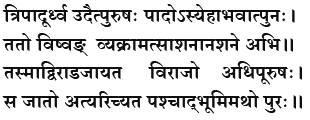
tripādūrdhva udaitpuruṣaḥ pādo'syehābhavātpunaḥ,
tato viśvaṅ vyakrāmatsāśanānaśane abhi.
tasmādvirāḍajāyata virājo adhipūruṣaḥ,
sa jāto atyaricyata paścādbhūmimatho puraḥ.
That, Three-footed (Immortal) Purusha stood
above transcending (all things), and His one foot was this (world of
becoming). Then He pervaded (everything) universally, the conscious as
well as the unconscious. From That (Supreme Being) did the Cosmic Body
(Virat) originate, and in this Cosmic Body did the Omnipresent
Intelligence manifest itself. Having manifested Himself, He appeared as
all diversity, and then as this earth and this body.tato viśvaṅ vyakrāmatsāśanānaśane abhi.
tasmādvirāḍajāyata virājo adhipūruṣaḥ,
sa jāto atyaricyata paścādbhūmimatho puraḥ.
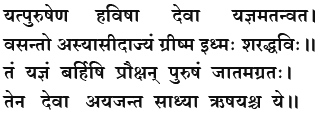
yatpuruṣeṇa haviṣā devā yajñamatanvata,
vasanto asyāsīdājyam grīṣma idhmaḥ śaraddhaviḥ.
taṁ yajaṁ barhiṣi praukśan puruṣaṁ jātamagrataḥ,
tena devā ayajanta sādhyā ṛṣayaśca ye.
When (there being no external material
other than the Purusha) the Devas performed a universal sacrifice (in
contemplation by mind), with the Purusha Himself as the sacred
offering, the spring season was the clarified butter, summer the fuel,
autumn the oblation. They set up for sacrifice the Purusha as the
object of their meditation—Him who was prior to all creation; and they,
the Devas, Sadhyas and Rishis, performed (this first sacrifice).vasanto asyāsīdājyam grīṣma idhmaḥ śaraddhaviḥ.
taṁ yajaṁ barhiṣi praukśan puruṣaṁ jātamagrataḥ,
tena devā ayajanta sādhyā ṛṣayaśca ye.
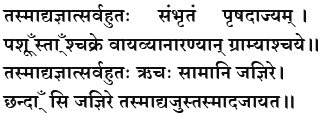
tasmādyajñātsarvahutaḥ saṁbhṛtaṁ pṛṣadājyam,
paśūgïstāgïścakre vāyavyānāraṇyān grāmyāścaye.
tasmādyajñātsarvahutaḥ ṛcaḥ sāmāni jajñire,
chandāgïsi jajñire tasmātyajustasmādajāyata.
From that (Purusha), who was of the form of
a Universal Sacrifice, the sacred mixture of curds and ghee (for
oblation) was produced. (Then) He brought forth the aerial beings, the
forest-dwelling animals, and also the domestic ones. From that
(Purusha), who was the Universal Sacrifice, the Riks and the Samans
were produced; from Him the metres (of the mantras) were born; from Him
the Yajus was born.paśūgïstāgïścakre vāyavyānāraṇyān grāmyāścaye.
tasmādyajñātsarvahutaḥ ṛcaḥ sāmāni jajñire,
chandāgïsi jajñire tasmātyajustasmādajāyata.
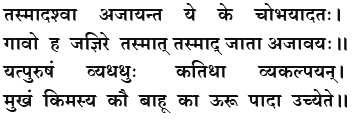
tasmādaśvā ajāyanta ye ke cobhayādataḥ,
gāvo ha jajñire tasmāt tasmād jātā ajāvayaḥ.
yatpuruṣaṁ vyadhadhuḥ katidhā vyakalpayan,
mukhaṁ kimasya kau bāhū kā vūrū pādā vucyete.
From Him were born horses and whatever
animals have two rows of teeth. Verily, cows were born of Him; from Him
were born goats and sheep. And when they contemplated the Purusha (as
the Universal Sacrifice), into how many parts did they divide Him (in
their meditations)? What was His mouth called, what were His arms, what
were His thighs, what were His feet called?gāvo ha jajñire tasmāt tasmād jātā ajāvayaḥ.
yatpuruṣaṁ vyadhadhuḥ katidhā vyakalpayan,
mukhaṁ kimasya kau bāhū kā vūrū pādā vucyete.
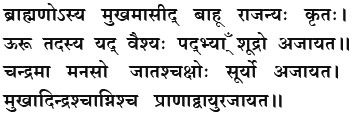
brāhmaṇo'sya mukhamāsīd bāhū rājanyaḥ kṛtaḥ,
ūrū tadasya yad vaiśyaḥ padbhyāgï śūdro ajāyata.
candramā manaso jātaḥcakśoḥ sūryo ajāyata,
mukhādindraścāgniśca prāṇādvāyurajāyata.
The Brahmana (spiritual wisdom and
splendour) was His mouth; the Kshatriya (administrative and military
prowess) His arms became. His thighs were the Vaisya (commercial and
business enterprise); of His feet the Sudra (productive and sustaining
force) was born. The Moon (symbol of the mind) was born from His
(cosmic) mind; the Sun (symbol of self and consciousness) was born from
His eyes. Indra (power of grasping and activity) and Agni (will-force)
came from His mouth; from His vital energy air was born.ūrū tadasya yad vaiśyaḥ padbhyāgï śūdro ajāyata.
candramā manaso jātaḥcakśoḥ sūryo ajāyata,
mukhādindraścāgniśca prāṇādvāyurajāyata.
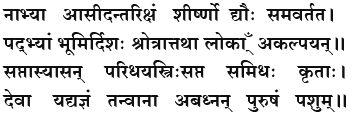
nābhyā āsīdantarikśam śīrṣṇo dyauḥ samavartata,
padbhyāṁ bhūmirdiśaḥ śrotrātathā lokāṁ akalpayan.
saptāsyāsṇ paridhyasṛitaḥsapta samidḥa kṛtaḥ,
devā yadyajñam tanvānā abaḍhnaṇ purūṣaṁ paśum.
(In that Universal Meditation as Sacrifice)
the firmament came from His navel; the heavens were produced from His
head; the earth from His feet; from His ears the quarters of space—so
they constituted the worlds. The enclosures of the sacrificial altar
were seven (the seven metres like the Gayatri), and twenty-one (the
twelve months, the five seasons, the three worlds and the sun) were the
logs of sacrificial fuel, when the gods (the pranas, the senses and the mind) celebrated the Universal Sacrifice with the Supreme Purusha as the object of contemplation therein.padbhyāṁ bhūmirdiśaḥ śrotrātathā lokāṁ akalpayan.
saptāsyāsṇ paridhyasṛitaḥsapta samidḥa kṛtaḥ,
devā yadyajñam tanvānā abaḍhnaṇ purūṣaṁ paśum.

yajñena yajñamayajanta devāḥtāni dharmāṇi prathamānyāsan,
te ha nākaṁ mahimānaḥ sacante yatra pūrve sādhyāḥ santi devāḥ.
By sacrifice (universal meditation) did the
gods adore and perform (visualise) the sacrifice (Universal Being).
These were the original creations and the original laws (that sustain
creation). Those great ones (the worshippers of the Cosmic Being by
this type of meditation) attain that Supreme Abode in which abide the
primeval contemplators (the gods mentioned above) who thus worshipped
that Being.te ha nākaṁ mahimānaḥ sacante yatra pūrve sādhyāḥ santi devāḥ.

vedāhametaṁ puruṣaṁ mahāntamādityavarṇaṁ tamasaḥ parastāt,
tameva viditva'timṛtyumeti nānyaḥ panthā vidyate'yanāya.
I know this Great Purusha who shines like
the sun beyond darkness. By knowing Him alone does one cross beyond
death; there is no other way of going over there.tameva viditva'timṛtyumeti nānyaḥ panthā vidyate'yanāya.
ōṁ śāntiḥ śāntiḥ śāntiḥ.
Om. May there be Peace, Peace, Peace.==
https://youtu.be/AsBQHgH_Z3I
https://youtu.be/U-NHJffUIIo
https://youtu.be/2wgl5VZvoZM
॥ ପୁରୁଷସୂକ୍ତ ॥
ଅଥ ପୁରୁଷସୂକ୍ତମ୍ ॥
ଓଂ ତଚ୍ଛଂ ୟୋରାଵୃଣୀମହେ । ଗାତୁଂ ୟଜ୍ଞାୟ । ଗାତୁଂ ୟଜ୍ଞପତୟେ । ଦୈଵୀ ସ୍ଵସ୍ତିରସ୍ତୁ ନଃ ।
ସ୍ଵସ୍ତିର୍ମାନୁଷେଭ୍ୟଃ । ଊର୍ଧ୍ଵଂ ଜିଗାତୁ ଭେଷଜମ୍ । ଶନ୍ନୋ ଅସ୍ତୁ ଦ୍ଵିପଦେ । ଶଂ ଚତୁଷ୍ପଦେ ।
ଓଂ ଶାନ୍ତିଃ ଶାନ୍ତିଃ ଶାନ୍ତିଃ ।
ହରିଃ ଓଂ ।
ଓଂ ସହସ୍ରଶୀର୍ଷା ପୁରୁଷଃ । ସହସ୍ରାକ୍ଷଃ ସହସ୍ରପାତ୍ ।
ସ ଭୂମିଂ ଵିଶ୍ଵତୋ ଵୃତ୍ଵା । ଅତ୍ୟତିଷ୍ଠଦ୍ଦଶାଙ୍ଗୁଲମ୍ । ୧
ପୁରୁଷ ଏଵେଦ ସର୍ଵମ୍ । ୟଦ୍ଭୂତଂ ୟଚ୍ଚ ଭଵ୍ୟମ୍।
ଉତାମୃତତ୍ଵସ୍ୟେଶାନଃ । ୟଦନ୍ନେନାତିରୋହତି । ୨
ଏତାଵାନସ୍ୟ ମହିମା । ଅତୋ ଜ୍ୟାୟାଶ୍ଚ ପୂରୁଷଃ ।
ପାଦୋଽସ୍ୟ ଵିଶ୍ଵା ଭୂତାନି । ତ୍ରିପାଦସ୍ୟାମୃତଂ ଦିଵି । ୩
ତ୍ରିପାଦୂର୍ଧ୍ଵ ଉଦୈତ୍ପୁରୁଷଃ । ପାଦୋଽସ୍ୟେହାଽଽଭଵାତ୍ପୁନଃ ।
ତତୋ ଵିଶ୍ଵଙ୍ଵ୍ୟକ୍ରାମତ୍ । ସାଶନାନଶନେ ଅଭି । ୪
ତସ୍ମାଦ୍ଵିରାଡଜାୟତ । ଵିରାଜୋ ଅଧି ପୂରୁଷଃ ।
ସ ଜାତୋ ଅତ୍ୟରିଚ୍ୟତ । ପଶ୍ଚାଦ୍ଭୂମିମଥୋ ପୁରଃ । ୫
ୟତ୍ପୁରୁଷେଣ ହଵିଷା । ଦେଵା ୟଜ୍ଞମତନ୍ଵତ ।
ଵସନ୍ତୋ ଅସ୍ୟାସୀଦାଜ୍ୟମ୍ । ଗ୍ରୀଷ୍ମ ଇଧ୍ମଃ ଶରଦ୍ଧଵିଃ । ୬
ସପ୍ତାସ୍ୟାସନ୍ପରିଧୟଃ । ତ୍ରିଃ ସପ୍ତ ସମିଧଃ କୃତାଃ ।
ଦେଵା ୟଦ୍ୟଜ୍ଞଂ ତନ୍ଵାନାଃ । ଅବଧ୍ନନ୍ପୁରୁଷଂ ପଶୁମ୍ । ୭
ତଂ ୟଜ୍ଞଂ ବର୍ହିଷି ପ୍ରୌକ୍ଷନ୍ । ପୁରୁଷଂ ଜାତମଗ୍ରତଃ ।
ତେନ ଦେଵା ଅୟଜନ୍ତ । ସାଧ୍ୟା ଋଷୟଶ୍ଚ ୟେ । ୮
ତସ୍ମାଦ୍ୟଜ୍ଞାତ୍ସର୍ଵହୁତଃ । ସଂଭୃତଂ ପୃଷଦାଜ୍ୟମ୍ ।
ପଶୂସ୍ତାଶ୍ଚକ୍ରେ ଵାୟଵ୍ୟାନ୍ । ଆରଣ୍ୟାନ୍ଗ୍ରାମ୍ୟାଶ୍ଚ ୟେ । ୯
ତସ୍ମାଦ୍ୟଜ୍ଞାତ୍ସର୍ଵହୁତଃ । ଋଚଃ ସାମାନି ଜଜ୍ଞିରେ ।
ଛନ୍ଦାସି ଜଜ୍ଞିରେ ତସ୍ମାତ୍ । ୟଜୁସ୍ତସ୍ମାଦଜାୟତ । ୧୦
ତସ୍ମାଦଶ୍ଵା ଅଜାୟନ୍ତ । ୟେ କେ ଚୋଭୟାଦତଃ ।
ଗାଵୋ ହ ଜଜ୍ଞିରେ ତସ୍ମାତ୍ । ତସ୍ମାଜ୍ଜାତା ଅଜାଵୟଃ । ୧୧
ୟତ୍ପୁରୁଷଂ ଵ୍ୟଦଧୁଃ । କତିଧା ଵ୍ୟକଲ୍ପୟନ୍ ।
ମୁଖଂ କିମସ୍ୟ କୌ ବାହୂ । କାଵୂରୂ ପାଦାଵୁଚ୍ୟେତେ । ୧୨
ବ୍ରାହ୍ମଣୋଽସ୍ୟ ମୁଖମାସୀତ୍ । ବାହୂ ରାଜନ୍ୟଃ କୃତଃ ।
ଊରୂ ତଦସ୍ୟ ୟଦ୍ଵୈଶ୍ୟଃ । ପଦ୍ଭ୍ୟା ଶୂଦ୍ରୋ ଅଜାୟତ । ୧୩
ଚନ୍ଦ୍ରମା ମନସୋ ଜାତଃ । ଚକ୍ଷୋଃ ସୂର୍ୟୋ ଅଜାୟତ ।
ମୁଖାଦିନ୍ଦ୍ରଶ୍ଚାଗ୍ନିଶ୍ଚ । ପ୍ରାଣାଦ୍ଵାୟୁରଜାୟତ । ୧୪
ନାଭ୍ୟା ଆସୀଦନ୍ତରିକ୍ଷମ୍ । ଶୀର୍ଷ୍ଣୋ ଦ୍ୟୌଃ ସମଵର୍ତତ ।
ପଦ୍ଭ୍ୟାଂ ଭୂମିର୍ଦିଶଃ ଶ୍ରୋତ୍ରାତ୍ । ତଥା ଲୋକା ଅକଲ୍ପୟନ୍ । ୧୫
ଵେଦାହମେତଂ ପୁରୁଷଂ ମହାନ୍ତମ୍ । ଆଦିତ୍ୟଵର୍ଣଂ ତମସସ୍ତୁ ପାରେ ।
ସର୍ଵାଣି ରୂପାଣି ଵିଚିତ୍ୟ ଧୀରଃ । ନାମାନି କୃତ୍ଵାଽଭିଵଦନ୍ ୟଦାସ୍ତେ । ୧୬
ଧାତା ପୁରସ୍ତାଦ୍ୟମୁଦାଜହାର । ଶକ୍ରଃ ପ୍ରଵିଦ୍ଵାନ୍ପ୍ରଦିଶଶ୍ଚତସ୍ରଃ ।
ତମେଵଂ ଵିଦ୍ଵାନମୃତ ଇହ ଭଵତି । ନାନ୍ୟଃ ପନ୍ଥା ଅୟନାୟ ଵିଦ୍ୟତେ । ୧୭
ୟଜ୍ଞେନ ୟଜ୍ଞମୟଜନ୍ତ ଦେଵାଃ । ତାନି ଧର୍ମାଣି ପ୍ରଥମାନ୍ୟାସନ୍ ।
ତେ ହ ନାକଂ ମହିମାନଃ ସଚନ୍ତେ । ୟତ୍ର ପୂର୍ଵେ ସାଧ୍ୟାଃ ସନ୍ତି ଦେଵାଃ । ୧୮
॥ ଓଂ ନମୋ ନାରାୟଣାୟ ॥
॥ ଉତ୍ତରନାରାୟଣମ୍ ॥
ଅଦ୍ଭ୍ୟଃ ସଂଭୂତଃ ପୃଥିଵ୍ୟୈ ରସାଚ୍ଚ । ଵିଶ୍ଵକର୍ମଣଃ ସମଵର୍ତତାଧି ।
ତସ୍ୟ ତ୍ଵଷ୍ଟା ଵିଦଧଦ୍ରୂପମେତି । ତତ୍ପୁରୁଷସ୍ୟ ଵିଶ୍ଵମାଜାନମଗ୍ରେ । ୧
ଵେଦାହମେତଂ ପୁରୁଷଂ ମହାନ୍ତମ୍ । ଆଦିତ୍ୟଵର୍ଣଂ ତମସଃ ପରସ୍ତାତ୍ ।
ତମେଵଂ ଵିଦ୍ଵାନମୃତ ଇହ ଭଵତି । ନାନ୍ୟଃ ପନ୍ଥା ଵିଦ୍ୟତେୟଽନାୟ । ୨
ପ୍ରଜାପତିଶ୍ଚରତି ଗର୍ଭେ ଅନ୍ତଃ । ଅଜାୟମାନୋ ବହୁଧା ଵିଜାୟତେ ।
ତସ୍ୟ ଧୀରାଃ ପରିଜାନନ୍ତି ୟୋନିମ୍ । ମରୀଚୀନାଂ ପଦମିଚ୍ଛନ୍ତି
ଵେଧସଃ । ୩
ୟୋ ଦେଵେଭ୍ୟ ଆତପତି । ୟୋ ଦେଵାନାଂ ପୁରୋହିତଃ ।
ପୂର୍ଵୋ ୟୋ ଦେଵେଭ୍ୟୋ ଜାତଃ । ନମୋ ରୁଚାୟ ବ୍ରାହ୍ମୟେ । ୪
ରୁଚଂ ବ୍ରାହ୍ମମ୍ ଜନୟନ୍ତଃ । ଦେଵା ଅଗ୍ରେ ତଦବ୍ରୁଵନ୍ ।
ୟସ୍ତ୍ଵୈଵଂ ବ୍ରାହ୍ମଣୋ ଵିଦ୍ୟାତ୍ । ତସ୍ୟ ଦେଵା ଅସନ୍ ଵଶେ । ୫
ହ୍ରୀଶ୍ଚ ତେ ଲକ୍ଷ୍ମୀଶ୍ଚ ପତ୍ନ୍ୟୌ । ଅହୋରାତ୍ରେ ପାର୍ଶ୍ଵେ ।
ନକ୍ଷତ୍ରାଣି ରୂପମ୍ । ଅଶ୍ଵିନୌ ଵ୍ୟାତ୍ତମ୍ । ଇଷ୍ଟମ୍ ମନିଷାଣ ।
ଅମୁଂ ମନିଷାଣ । ସର୍ଵମ୍ ମନିଷାଣ । ୬
ଓଂ ତଚ୍ଛଂ ୟୋରାଵୃଣୀମହେ । ଗାତୁଂ ୟଜ୍ଞାୟ । ଗାତୁଂ ୟଜ୍ଞପତୟେ । ଦୈଵୀସ୍ସ୍ଵସ୍ତିରସ୍ତୁ ନଃ ।
ସ୍ଵସ୍ତିର୍ମାନୁଷେଭ୍ୟଃ । ଊର୍ଧ୍ଵଂ ଜିଗାତୁ ଭେଷଜମ୍ । ଶନ୍ନୋ ଅସ୍ତୁ ଦ୍ଵିପଦେ । ଶଂ ଚତୁଷ୍ପଦେ ।
ଓଂ ଶାନ୍ତିଃ ଶାନ୍ତିଃ ଶାନ୍ତିଃ ।
No comments:
Post a Comment